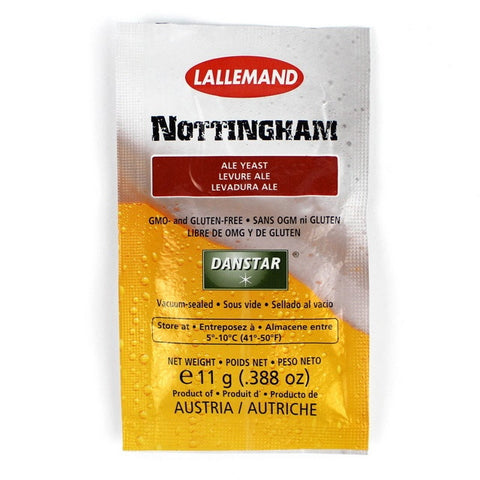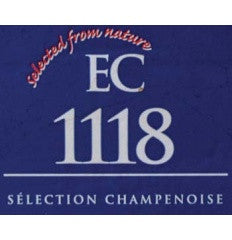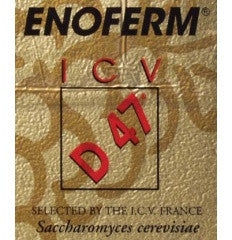
Nottingham Ale Dry Yeast
If you are looking for amazing versatility from an ale yeast, look no further than Nottingham dry brewing yeast. Nottingham offers great performance with every batch, allowing brewers to cover a wide variety of beer styles with just one yeast type. The Nottingham strain was selected for its highly flocculant & relatively full attenuation properties. It produces low concentrations of fruity and estery aromas and has been described as neutral for ale yeast, allowing the full natural flavor of malt & hops to develop. The recommended fermentation temperature range of this strain is 14° to 21°C (57° to 70°F) with good tolerance to low fermentation temperatures (12°C/54°F) that allow this strain to be used in lager-style beer. With a relatively high alcohol tolerance, Nottingham is a great choice for creation of higher-alcohol specialty beers! Nottingham is available in 11 gram vacuum-sealed packets.
Microbiological Properties:
• Classified as Saccharomyces cerevisiae. • A top fermenting yeast. • The typical analysis of the active dried strain: Percent solids 93%–95% Living yeast cells 5 x 109 per gram of dry yeast Wild yeast < 1 per 106 yeast cells (Lysine method)* Bacteria < 1 per 106 yeast cells* • Finished product is released to the market only after passing a rigorous series of tests. *According to ASBC and EBC methods of analysis.
Brewing Properties:
• Quick start to fermentation, which can be completed in 4 days above 17°C.
• High attenuation, reaching a final gravity near 1008 (2°P).
• Fermentation rate, fermentation time and degree of attenuation is dependent on inoculation density, yeast handling, fermentation temperature and the nutritional quality of the wort.
• Shows flocculation at completion of fermentation, and settling is promoted by cooling and use of fining agents and isinglass.
• The aroma is slightly estery, almost neutral and does not display malodours when properly handled. Because of flocculation, it may tend to slightly reduce hop bitter levels.
• Best when used at traditional ale temperatures after rehydration in the recommended manner.
• Lager-style beer has been brewed with Nottingham, however low fermentation temperature requires adaptation of the pitching rate to ensure proper attenuation.
We Also Recommend


